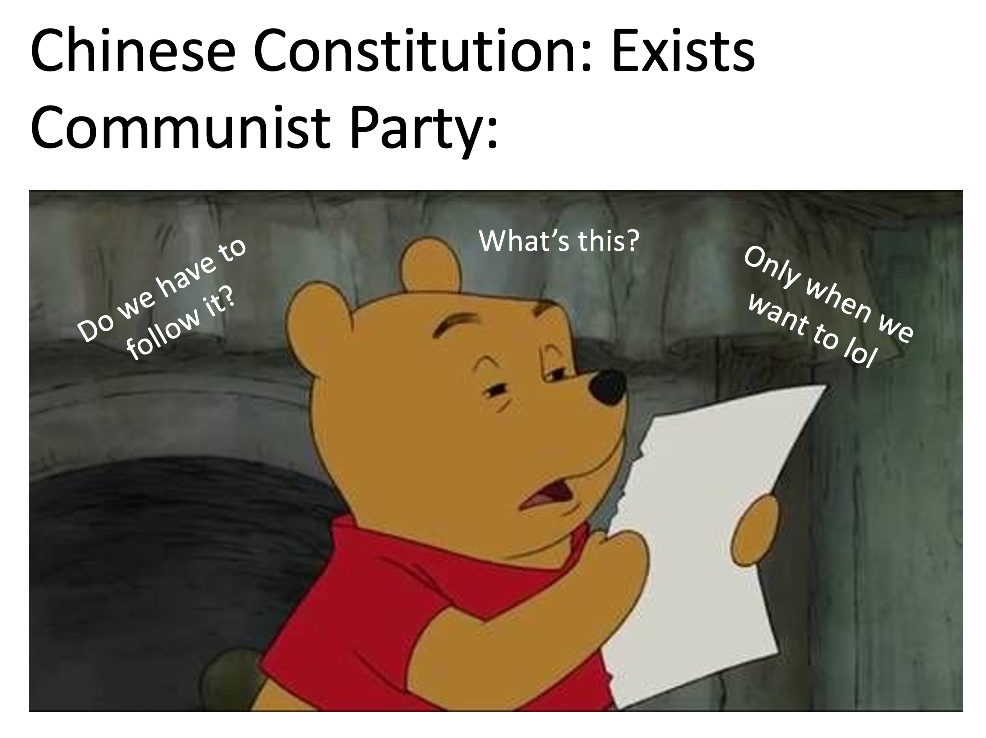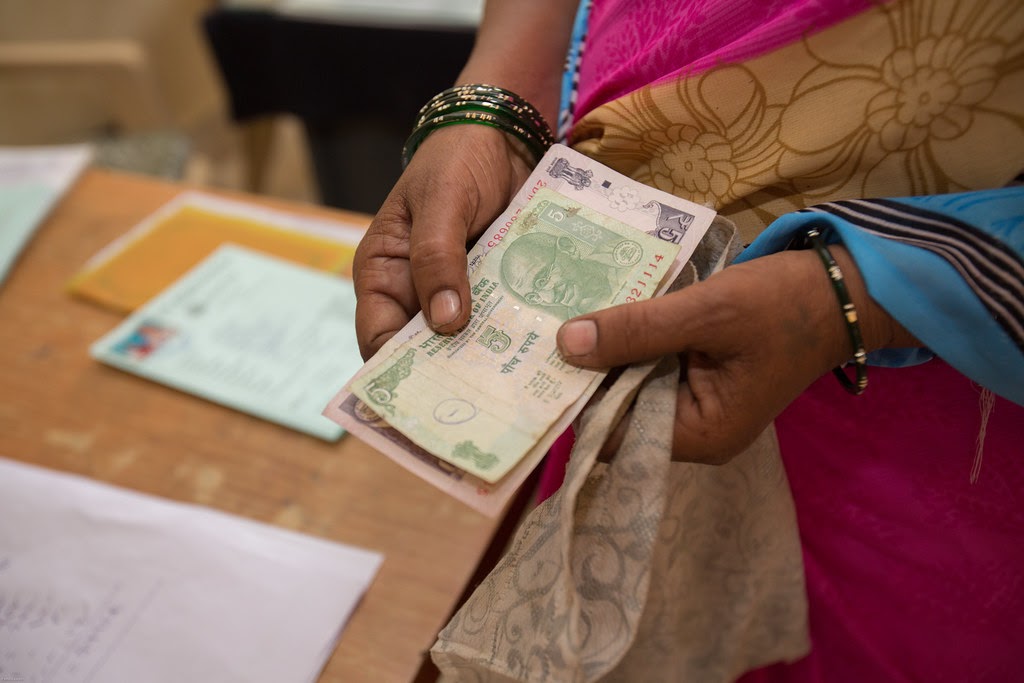A Hong Kong Police Department riot officer brandishes his weapon at protesters in a metro car.
On June 4, thousands of Hongkongers defied a ban on large gatherings to commemorate the thirty-first anniversary of the Tiananmen Square Massacre, the Chinese People’s Liberation Army’s infamous violent crackdown on protesting students and workers. The anniversary comes one week after the National People’s Congress, the not-so-independent legislative branch of the Chinese government, voted almost unanimously to draft a national security law that alters Hong Kong’s Basic Law, the administrative region’s mini-constitution.
The national security law, nominally intended to suppress destabilizing factors and weed out external interference, entered into force on June 30. It allows Chinese security agencies to operate in Hong Kong and creates a new extrajudicial Hong Kong police unit. It overrides Hong Kong’s local laws and criminalizes separatism, subversion, terrorism, and collusion with foreign actors.
China has previously used these broadly defined labels to justify mobilizing intelligence operatives and counterterrorism units. It is also how China rationalizes jailing lawyers and censoring Winnie the Pooh. Hongkongers convicted of these offenses can now face life imprisonment. Sensitive trials, such as those involving state secrets, can now be conducted without a jury.
The law applies to everyone, everywhere; it can be used to prosecute people in Hong Kong for actions committed abroad. Chinese and non-Chinese citizens can be detained in Hong Kong over their activities outside Chinese jurisdiction. Even those simply transferring flights in Hong Kong International Airport are at risk.
The law is the final nail in the coffin for China’s promise to honor Hong Kong’s autonomy until July 1, 2047. Under the One Country, Two Systems model—established in the Sino-British Joint Declaration and enshrined in Hong Kong’s Basic Law—the city’s government has the right to formulate its own policies and pursue foreign affairs.
Beijing circumvented Hong Kong’s representatives when drafting the security bill, notifying them about the proposal only at the last minute. The law legitimizes Chinese security operations in the administrative region. For some Hongkongers, this is the latest example of Beijing’s encroachment on their autonomy.
In 2017, the Chinese government heavily lobbied to get Carrie Lam, a pro-Beijing candidate, elected as the chief executive of the city’s election committee. A year later, immigration officers—sworn to abide by Chinese immigration law—were posted in the city’s new West Kowloon station. China’s liaison office declared that the central government’s Hong Kong and Macau Affairs Office could handle Hong Kong’s local affairs; the arrest of pro-democracy lawmakers followed. Even booksellers have been targeted, as some have mysteriously disappeared only to reappear in Chinese prisons.
The national security law’s effects are already observable. Within hours of the law being enacted, Demosistō, the pro-democracy political party founded and led by Umbrella Movement student leaders Agnes Chow, Joshua Wong, and Nathan Law, announced its disbandment. Businesses have started taking down messages of support for protests, and libraries have begun removing pro-democracy books from their shelves. “[The law] marks the end of Hong Kong that the world knew before,” Wong said. “With sweeping powers and ill-defined law, the city will turn into a secret police state.”
As the law’s profound implications threaten to derail the already abysmal year of 2020, onlookers should remember why Hong Kong is uniquely important. Its history has put Hong Kong and China on a collision course that appears to be climaxing. Meanwhile, the onlookers—global powers weaker than China—have been passive.
Not Just Another Chinese City
When the British captured Hong Kong in 1841, the area was little more than a lightly inhabited set of islands with scattered fishing villages. It was built, developed, and fostered under British rule, which allowed Hong Kong to transform into a booming trade hub distinct from China. The majority of Hong Kong’s population hails from provinces in the Chinese South; most descend from those who fled their ancestral motherland during the bloodshed, chaos, famine, and poverty of the late Qing, Republican, and Maoist eras.
The Chinese central government, administered from the North, has historically (and arguably presently) demonstrated diminished capacity in the South, with the political North and commercial South holding long-lasting cultural differences. The southernmost historical capital was still more than a thousand kilometers from Hong Kong, sparing the city from much of the imperial bureaucracy that governed the North.
China’s tradition of relative non-interference and Britain’s colonial dominance left Hong Kong with a distinct culture that fuses Chinese social values—such as face, family, and community—with Western political values, such as liberty, democracy, and judicial independence. The end result is a city populated by the descendents of Chinese refugees who prospered under a core political philosophy different from Beijing’s.
Political thought aside, Hong Kong’s 7.5 million inhabitants are vastly outnumbered by China’s 1.4 billion residents. Hong Kong’s population is overwhelmingly Cantonese but includes minorities, immigrants, and expatriates. China is demographically different, as the country spans fifty-six ethnic groups, each with a myriad of different clans, cultures, and dialects.
Hong Kong is also distinct because it serves an incredibly niche role within Chinese society, politics, and economics. The city is a vital gate for investors, industrialists, and entrepreneurs to the restrictive Chinese market. In 2018, Hong Kong facilitated 54 percent of inbound and 58 percent of outbound foreign direct investment.
Corporations and investors, including Chinese state-owned enterprises, invest and sell shares in Hong Kong because of the city’s international exposure, strong rule of law, and established capitalist framework. Hong Kong’s markets are even spearheading the Chinese yuan’s rise as a global currency by hosting an array of trade and services conducted in yuan.
Hong Kong is more cosmopolitan and global than other Chinese cities. Expatriates, immigrants, and temporary residents favor Hong Kong because it grants them access to China’s market without costing them their freedom. Furthermore, Hong Kong’s institutions use English as an official language, making the city more linguistically accessible.
These factors have allowed the city’s expatriate and immigrant populations to skyrocket. But with Hong Kong’s autonomy vanishing, many who were once lured by the city’s prospects are now questioning whether to stay or leave.
To protect its market from external competition and influence, China engages in global trade through Hong Kong. The country limits foreign market participation so their companies maintain a competitive edge. These firms then use Hong Kong as a space to conduct business with international firms, gaining access to foreign capital and markets.
Beijing’s premature erosion of Hong Kong’s promised autonomy diminishes the city’s economic potential by closing the gate through which much of China’s wealth flows. Hong Kong is a special city whose autonomy has yielded benefits to China matched by few, if any, other Chinese cities. Beijing’s effort to vanquish this autonomy risks diminishing, or even eliminating, these advantages.
From Imperial Peking to Communist Beijing
While Hong Kong’s economic, political, and cultural benefits to China are evident, Beijing has more on its mind. Unresolved historical grievances have impacted Chinese governance, culminating in Beijing’s often hawkish outlook and nationalist motivations. The historical development of Hong Kong’s affinity to Western political values and governance styles has spurred Beijing’s animosity toward them.
London and Beijing are old foes, with their violent and mercantilist confrontations dating back centuries, when the latter was still called “Peking” in English. The mid-nineteenth century Opium Wars established British rule in Hong Kong and marked the territory’s beginning as a prosperous maritime trade and commercial hub. However, many Chinese view the wars as a national humiliation.
The Opium Wars stripped the Qing Dynasty—which previously managed the world’s largest economy—of its sovereign right to set its own economic and trade policies. The British forced the imperial government to open ports and rivers to their merchants, leading to an influx of British opium. China quickly collapsed into a bankrupt, impoverished, and fractured narco-state. It was forced to defend against countless foreign incursions and suppress internal uprisings, including the Taiping Rebellion, the bloodiest civil war in human history.
The Qing Dynasty collapsed into a period known as the Century of Humiliation, during which foreign powers, spearheaded by the British, invaded China, raped and murdered its people, forced extraterritorial rights, and mauraded its cities. When Chinese civilian militias—and later the Chinese army—began attacking foreign settlements, foreign powers united. Known as the Yihetuan Movement (or the Boxer Rebellion), the conflict was devastating; cultural and historical sites, including the Summer Palaces and Temple of Heaven, were looted, destroyed, captured, or occupied.
As the Qing era ended, foreign indifference to Chinese suffering did not—the Republican era witnessed similar tales. On May 30, 1925, British police in Shanghai opened fire on a crowd of unarmed protesters. Less than a month later, British and French soldiers mirrored this action in Canton during the Shakee Massacre. During Japan’s attempt to conquer China, Western powers declared neutrality, despite having extraterritorial concessions in Chinese cities. This neutrality did not end until the US, which was covertly supporting China, declared war on Japan in 1941.
As a result, the Chinese Communist Party’s policies toward Britain have long been motivated by violence and vengeance. In April 1949, before the communists even took control of the central government, People’s Liberation Army artillery units shelled the HMS Amethyst as it traversed the Yangtze River towards the British embassy. Seventeen British sailors were killed, and Royal Navy reinforcements also sustained fire and casualties.
Chinese history, or at least Beijing’s version of it, presents a very different image of the British and the West than Hong Kong’s. While some Hongkongers wave the colonial British flag to show endearment for the system that promoted and protected their city’s growth, some Chinese elites view the flag as a symbol of foreign imperialism.
China is now an industrialized superpower with a rapidly modernizing military—its power growing faster than Britain’s. As such, Communist Party hawks and Chinese nationalists are eager to dismantle Hong Kong’s British heritage, a prominent symbol of foreign dominion in China.
Money or Dignity?
“He said that the Chinese could walk in and take Hong Kong back later today if they wanted to. I retorted that they could indeed do so; I could not stop them. But this would bring about Hong Kong’s collapse. The world would then see what followed a change from British to Chinese rule.”
– Margaret Thatcher on Deng Xiaoping’s threat to invade Hong Kong in 1982
Global powers have long been concerned about how China uses its power. Foreign governments and international organizations frequently criticize the Communist Party for its forced Sinicization of Uyghurs and blatant disregard for international law. Despite this, global responses rarely exceed actionless statements from political leaders and submission from business executives unwilling to challenge a dictatorship that controls the second-biggest economy in the world.
The Chinese government and its activities should be internationally scrutinized and held to high standards. As a superpower, China heavily influences the world. Its actions affect not only its own citizens, but also those of other countries, for better or worse. China’s delayed response to the COVID-19 pandemic, for instance, cost the world valuable time and resulted in greater global suffering.
Britain’s response to the new security law is the most notable among global powers; the country will offer residence and a path to citizenship to those who qualify for British National (Overseas) (BN(O)) passports. These passports were exclusively offered to Hongkongers prior to the city’s handover and allows holders to apply for British Overseas Territories citizenship. This establishes a person’s British nationality and grants them “consular assistance and protection from UK diplomatic posts.” However, it does not guarantee the right to live in work in the UK, limiting the ability for Hongkongers to immigrate.
The UK’s plan to update the power of BN(O) passports will provide around three million Hongkongers the ability to work and reside in the UK for up to five years. Afterwards, these residents could apply for settled status and then British citizenship. It also respects Chinese sovereignty, as it does not interfere with China’s governance capacity.
As Beijing blatantly disregards the United-Nations-recognized Sino-British Joint Declaration, the British government, previously timid, is showing some willingness to welcome the talents and entrepreneurship of its former colonial subjects. Its announced policy shift competes against Chinese policies without directly retaliating against a global power that is seldom concerned with other governments’ opinions. However, Britain lacks the leverage to protect Hongkongers or confront China, and will need the support of other countries.
The United States—the UK’s closest ally—has not always been so helpful. After China began drafting the security bill, the Trump administration announced that it would remove Hong Kong’s special trade status so its market and exports are classified with China’s. This policy is logical, since Hong Kong is now less autonomous from the Chinese market and its regulations. However, its potential to help Hongkongers is questionable because it puts Hong Kong in the crossfire. Trump is attacking the city’s competitiveness by subjecting it to the same regulations as China.
Unrecognizing Hong Kong’s special status will likely exacerbate Sino-American tensions and prompt a capital flight from the city. It certainly did not inspire a change of heart in Chinese hardliners, who are more concerned with “correcting” history than economics. Beijing might also believe that Shanghai’s rise as a financial hub and Shenzhen’s development as an innovation center mitigate Hong Kong’s importance.
Others in Washington have made smarter moves. The Department of State declared that it would restrict visas for former and current Chinese officials. This policy actually admonishes Beijing and targets those who influenced the creation and enactment of the national security law. Additionally, Congress unanimously passed a bill that will impose sanctions upon institutions that sponsor China’s violation of Hong Kong’s autonomy. This specifically targets those who financially and materially assist Beijing’s ambitions.
Save for the US and UK, no nation has attempted to support Hong Kong or reprimand Beijing. The most prominent EU members—concerned about the role Chinese trade relations will have on post-pandemic recovery—have offered only cautious condemnation, discussing plans to decrease their dependence on China’s economy. Furthermore, Japan, an ancient Chinese rival, initially remained silent before volunteering to lead a united G7 statement on the situation. However, this assertion would be another example of international condemnation that Beijing will almost certainly refute or ignore. Despite harboring concern over the erosion of the Basic Law, Brussels and Tokyo are too afraid of bankruptcy to do anything other than release statements, as if somehow Beijing can be shamed into changing its stance. Good luck with that.
Business leaders from around the world have also remained passive, as those who have angered the Communist Party end up kowtowing or suffering losses. After the general manager of the Houston Rockets—the old team of Chinese icon Yao Ming—voiced support for Hong Kong’s pro-democracy protesters, Beijing cut the NBA out of its market. The hotelier Marriott had to apologize and adjust its website after listing Tibet, Taiwan, Hong Kong, and Macau as separate countries. Some companies have yet to heal their wounds; when Dolce & Gabbana released an advertisement in 2018 making fun of chopsticks, they saw their Chinese sales plummet. It has not recovered.
In order to avoid the same fate, Hong Kong’s billionaire tycoons have vocally endorsed the security law. HSBC and Standard Chartered—British megabanks that trace their roots to Hong Kong and are still highly active there—followed suit, an insult to the economic and legal traditions that fostered their businesses.
As Beijing’s iron grip tightens around Hong Kong, the Communist Party will continue testing the limits of its political and economic might, using both to encourage silence and tolerance toward its policies. A Chinese proverb states, “the bird that sticks its head out gets shot.” Hong Kong’s liberal system and autonomy certainly make it stick out among Chinese cities, and so the Communist Party consistently uses force. How long before their guns misfire?




